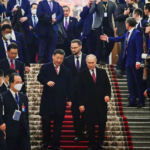
This article was first published in The New York Post on March 21, 2023. Click Here to read the original article.
Chinese President Xi Jinping’s summit with Russian President Vladimir Putin is more evidence of the increasingly worldwide nature of the threats facing the United States and its allies.
Beyond discussing Xi’s “peace plan” for the Ukraine war, the Moscow meeting further crystallizes the 21st-century’s anti-Western Axis.
Putin wrote that Russian-Chinese relations “today practically represent the cornerstone of regional, even global stability.”
He greeted his “dear friend” Xi, who proffered his “deep gratitude,” adding that China’s “friendship” with Russia is “growing day by day.”
There is little joy in Kyiv over the Chinese proposals, and there should be even less in Washington, since they amount to little more than a Sino-Russian propaganda exercise.
Putin characterized Russia’s war of unprovoked aggression against Ukraine as an “acute crisis,” which is certainly one way to put it.
Beijing’s Western sympathizers, during the nearly 13 months of Moscow’s unprovoked aggression against Ukraine, have repeatedly contorted themselves to explain that China was embarrassed by Russia’s conduct, China wanted to “separate” itself from Russia and China was not significantly aiding Russia’s war effort.
These assertions were palpably untrue even when the apologists were making their apologia and now stand fully exposed.
Today, it is the West’s China apologists who should be embarrassed.
In reality, China is the Ukraine war’s biggest winner no matter how it ends.
If Russia prevails in whole or in part, it is China’s ally that is victorious, over bitter Ukrainian resistance and substantial US and NATO assistance, thereby increasing the threat to other former constituent parts of the Soviet Union and to Western Europe generally.
And if Moscow is defeated, Beijing’s ally will be even more heavily reliant on China and thus even more in its thrall. It is hard to describe a range of scenarios more to Xi’s liking.
Unfortunately, Ukraine and the rest of the former Russian empire will not be the only targets of this new Eurasian Axis.
By denying the legitimacy of the basis on which the USSR dissolved, the Kremlin is calling into question the security of all former Soviet republics, including the three Baltic states, now NATO members.
In East Asia, Taiwan is urgently strengthening its defenses, while the United States, Japan and other allies consider larger structures of collective self-defense to blunt any hegemonic Chinese ambitions.
Others along China’s Indo-Pacific periphery are growing understandably nervous.
Russia and China, Security Council permanent members, immunized by their United Nations Charter-granted veto powers and deemed legitimate nuclear-weapons states by the Nuclear Nonproliferation Treaty, are on the move, accompanied by assorted hangers-on like North Korea, Iran, Belarus and other nations not yet out of the closet.
Following China’s recent, surprising brokering of an agreement between Saudi Arabia and Iran to restore their sundered relations, who can predict what their next diplomatic ploy might be?
Even more graphically, after decades of the West pretending there was a “rules-based international order,” and the supposed deterrent impact of the International Criminal Court, Xi arrived in Moscow just days after the ICC issued an arrest warrant for Putin.
The Kremlin’s leader had immediately disdained the warrant by traveling to Russian-occupied Ukraine, both Crimea and the Donbas.
Neither China nor Russia are parties to the ICC’s Rome Statute, and neither is likely to sign up any time soon. A Chinese foreign ministry spokesman directly contradicted the ICC’s action, calling on the court to “respect the jurisdictional immunity of a head of state under international law.” (America is also not an ICC member, largely because of its fundamental illegitimacy.)
Moreover, during the COVID pandemic and until the present day, China has shown exactly what it thinks of the World Health Organization, systematically obstructing UN investigation of COVID’s origins and protecting China’s interests against other affected nations’.
And neither Russia nor China will contribute significantly toward substantive agreements or action in international climate-change negotiations.
Even on international trade and investment, the increasing prospects of long-term struggle between the Eurasian Axis and the West are growing rapidly.
So much for the benefits and protections of multilateral diplomacy. The only good news that might emerge from the Putin-Xi meeting is that Westerners who didn’t previously perceive the malign intentions of Russia and China will be awakened — and not a moment too soon.
John Bolton was national security adviser to President Donald Trump, 2018-19, and US ambassador to the United Nations, 2005-06.